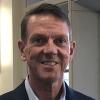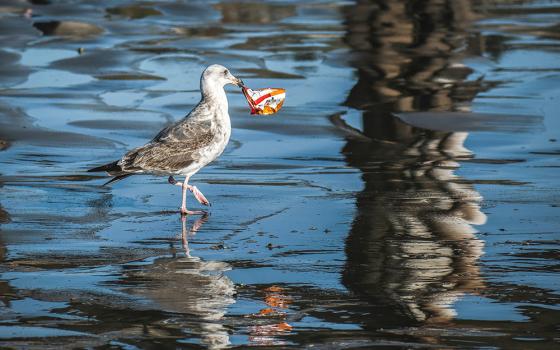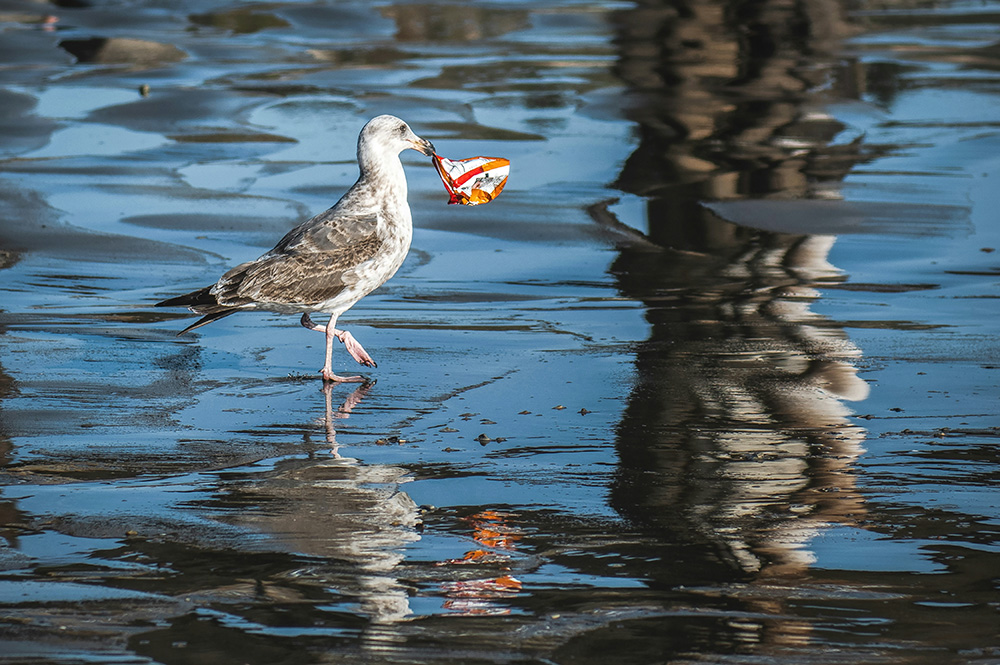
A bird picks up a piece of trash on Avila Beach along California's central coast. (Unsplash/Tim Mossholder)
Things appear bleak at the United Nations climate change conference, COP29, in Baku, Azerbaijan, especially given the current geopolitics.
"The world is not in a good place at the moment," observed Irish climate minister Eamon Ryan, who added, "The change in the U.S. administration is not going to make it any easier."
During his first term, Donald Trump pulled the U.S. from the Paris Agreement, the 2015 global climate accord. Given that the president-elect has called climate change a "hoax" and repeatedly pledged during his campaign to "drill, baby, drill," there is worry that, as former U.N. climate head Christiana Figueres notes, "the result from this election will be seen as a major blow to global climate action."
Indeed, Trump's nomination of former New York congressman Lee Zeldin, who has opposed climate-related legislation, to direct the U.S. Environmental Protection Agency runs counter to our responsibility to "care for our common home," as Pope Francis put in his 2015 encyclical, Laudato Si'.
2024 is on pace to be the hottest year on record, as well as the first calendar year to exceed the Paris Agreement threshold of limiting global warming to 1.5 degrees Celsius (2.7 degrees Fahrenheit) above preindustrial levels. Carbon emissions from fossil fuels, the single biggest contributor to global warming, reached a record high in 2024, according to the latest assessment presented at the COP29 climate talks.
While climate did not claim a significant place in the U.S. elections, here in the Republic of Ireland it is receiving more attention from political parties and candidates ahead of Nov. 29 general elections.
Advertisement
Given the impacts of climate change, such as the recent flooding in Valencia, Spain, and also in parts of Ireland earlier this year, it "may have a higher priority," according to Brian Ó Gallachóir, associate vice president of sustainability at University College Cork. He adds, "For young people, and increasingly people across generations, who are experiencing climate anxiety, it will likely have a higher priority."
Yet, even on the Emerald Isle, there is concern that we will fall short of meeting our 2030 emissions-reduction target.
One consequence of climate change is that it threatens many species with extinction.
Pope Francis writes in Laudato Si': "Warming has effects on the carbon cycle. It creates a vicious circle which aggravates the situation even more, affecting the availability of essential resources like drinking water, energy and agricultural production in warmer regions, and leading to the extinction of part of the planet's biodiversity."
At COP29, the International Union for the Conservation of Nature shared that 44% of reef-building corals face extinction, a loss that will have devastating effects on other marine life.
In Ireland, more than a quarter of species of flora and fauna are at risk of extinction. Indeed, 25% of Ireland's bird species are in severe decline with an additional 37% showing moderate declines.
In North America, 389 bird species — two-thirds of birds on the continent — are at risk of extinction due to climate change, according to the National Audubon Society. The latest bird in Europe and the Mediterranean thought to be extinct is the slender-billed curlew.
According to BirdLife International, birds enable us to "take the pulse of the planet," and its 2022 report "paints the most concerning picture yet of the future of avian species and, by extension, all life on Earth."
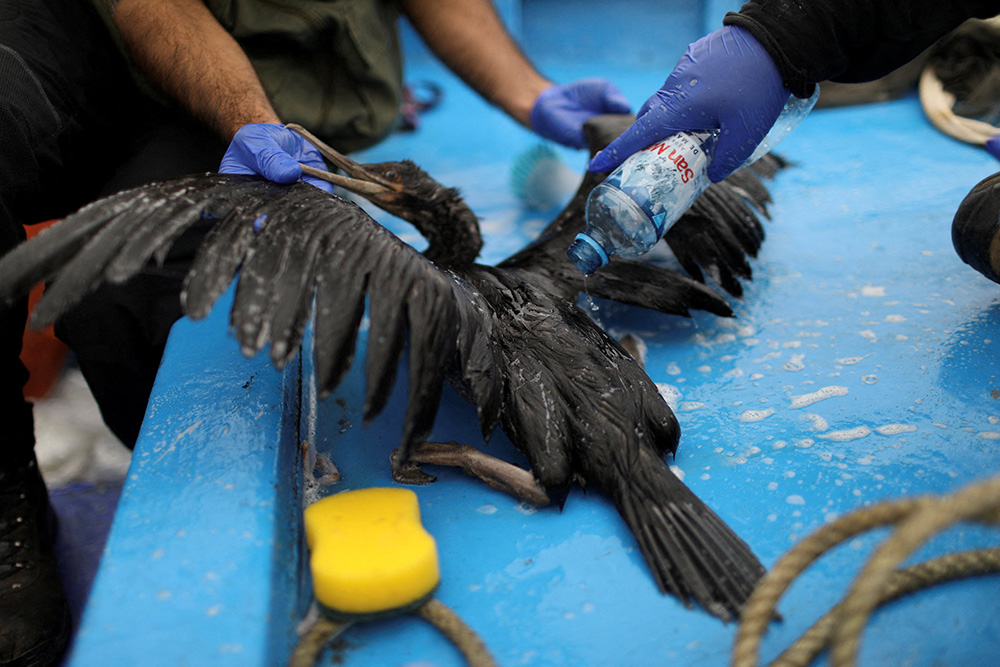
Biologists from the National Service of Protected Natural Areas work with a bird on Jan. 21, 2022, in Ancón, Peru, affected by an oil spill near Lima. (CNS/Reuters/Pilar Olivares)
I have been in awe of birds since my childhood.
At St. Joseph's Catholic School in smalltown Blakeslee, in rural northwestern Ohio, the sisters taught us about St. Francis of Assisi, including his special relationship with birds. I remember my attempts afterward to speak and, like St. Francis, to "preach" to birds on our farm and in the woods, hoping that they, too, would fly to my outstretched arm. Aside from a parakeet that was a pet during my teen years, I never succeeded.
Nevertheless, over the years I have continued to say "hello" if not preach to birds.
Just over a year ago, a pigeon surprised me during my daily runs through the fields and trees on the university's campus where I teach in Maynooth. When I first noticed her, she was foraging with other pigeons in the grass alongside the path. Unlike her fellow fowl, she did not fly away upon my approach. I greeted her daily as she watched me go by.
When one day I sat down for a moment, she seemed interested in me, listening when I complimented her: "You're a pretty bird." One day I brought her bits of a cracker, though she didn't eat any; in another encounter, she neared my hand and started pecking at my wedding band.
The next time I jogged past her, I heard a flutter behind me. Upon turning around, the pigeon flew straight for my head, where she then landed. For the next several weeks, nearly every day, she flew from the grass or from the chestnut trees to my head or to my outstretched arm and hand.
Other runners, people walking their dogs and parents with their children would stop, express their astonishment and take photos. Colleagues at St. Patrick's and friends on social media said it reminded them of St. Francis or St. Kevin of nearby Glendalough.
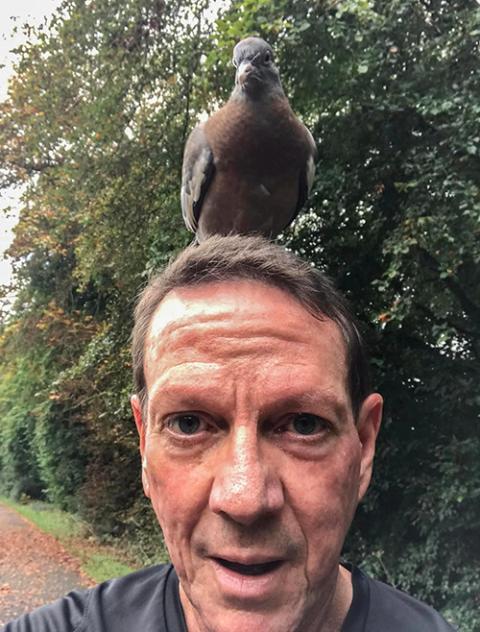
Tobias Winright and "Pippa," the wood pigeon (Courtesy of Tobias Winright)
She seemed too large to be a dove, but Pippa, as my family named her, still symbolized peace for me, even after one of my daughters informed me that she was probably a juvenile wood pigeon. The Irish name for wood dove is colm coille, and its scientific name is Columba palumbus. Indeed, the name of Irish St. Columba meant "dove." In the Old French pijon meant "young dove," and it probably came from the Latin pipionem (nominative pipio) for a "young chirping bird," so it turns out Pippa's name was a fitting one.
I came to see Pippa as my feathered friend, my own experience of Pope Francis' words in Laudate Deum that "human life is incomprehensible and unsustainable without other creatures" who are "our companions along the way." I looked forward to encountering her each day during my jog.
I found myself missing her last November while back in Ohio running daily along the Maumee River in Toledo. Sadly, after my return to Ireland several days later, I never saw Pippa again.
Did she migrate? Did she find a mate? I do not know. I still keep my eyes open for her all these months later. But a sense of loss lingers.
At least Pippa is unlike Martha, the world's last passenger pigeon whose species was doomed to extinction by the conversion of forests to farmland by settlers in the 1880s.
"The great majority [of plants and animals] become extinct for reasons related to human activity," Pope Francis observes in Laudato Si'.
Climate change poses even more of a threat today than deforestation did a century ago. If not the wood pigeon, too many other species of birds are increasingly at risk. "Because of us," laments Pope Francis in his encyclical, "thousands of species will no longer give glory to God by their very existence, nor convey their message to us."
Indeed, the pope says that St. Francis "invites us to see nature as a magnificent book in which God speaks to us and grants us a glimpse of his infinite beauty and goodness." Instead of my attempts to speak to birds, we need to listen to what they have to say — to preach — to us and how it is we who need an "ecological conversion."
An important part of this conversion, the pope says, will be "developing programs and strategies of protection with particular care for safeguarding species heading towards extinction."
As Mohamed Adow, director of the PowerShift Africa climate think tank, warned from the COP29 climate summit: "We have an opportunity of a lifetime to protect Earth and life on it. But an opportunity of a lifetime matters only if it's attained during that lifetime. This is the only lifetime we have. We must protect our planet for it to sustain life."
After all, this is the only lifetime our "companions along the way" have, too.
